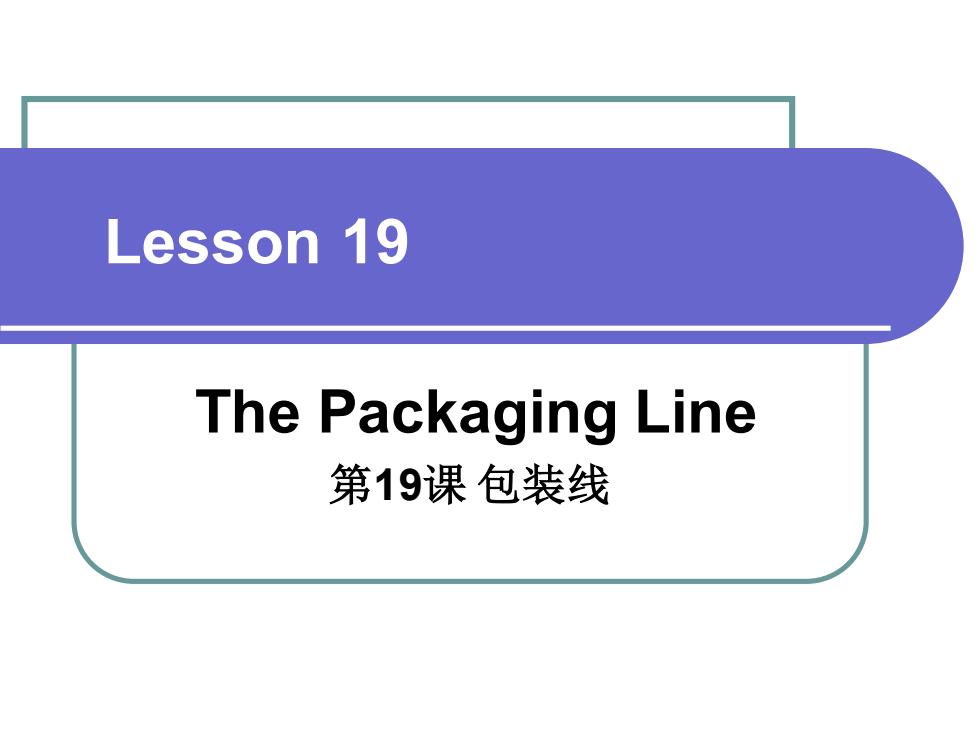
Lesson 19 The Packaging Line 第19课 包装线
Lesson 19 The Packaging Line 第19课 包装线
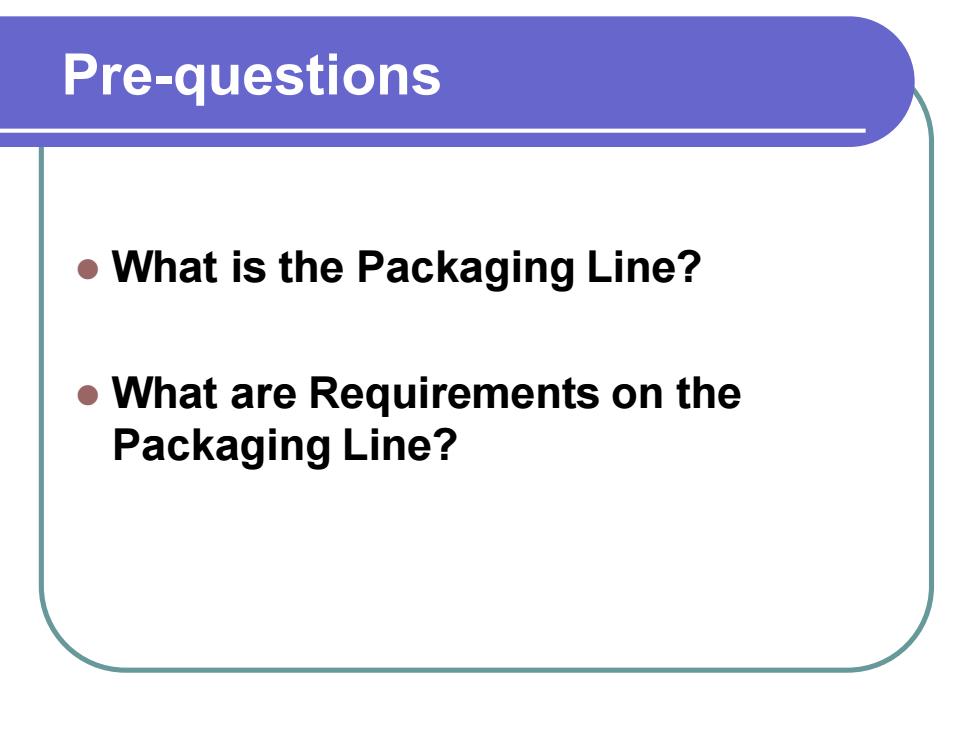
Pre-questions ⚫ What is the Packaging Line? ⚫ What are Requirements on the Packaging Line?
Pre-questions ⚫ What is the Packaging Line? ⚫ What are Requirements on the Packaging Line?
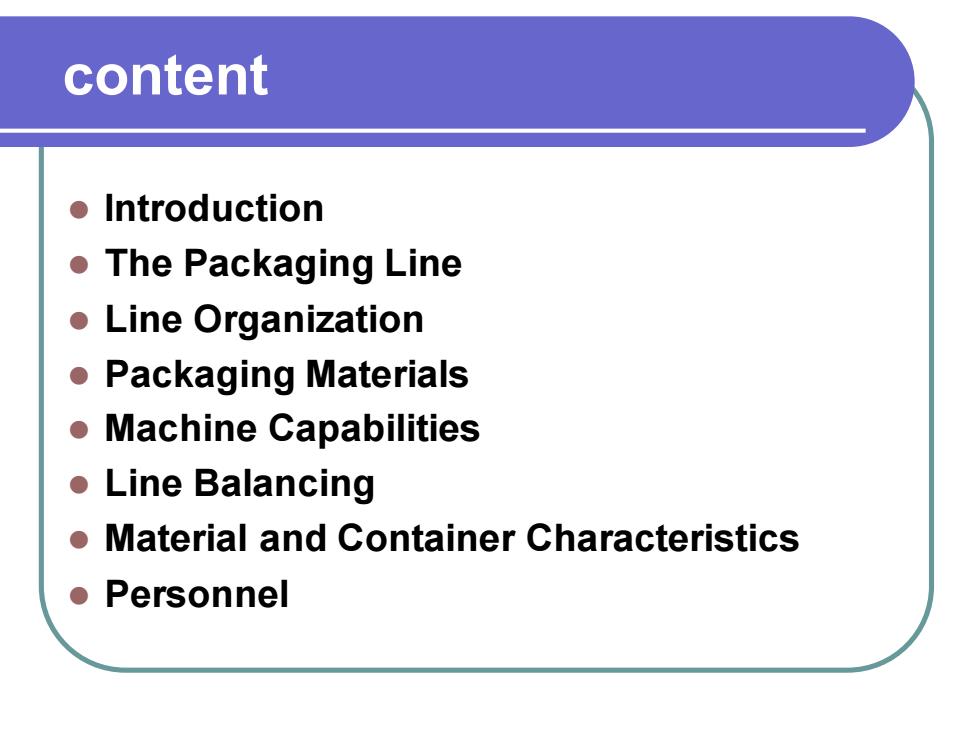
content ⚫ Introduction ⚫ The Packaging Line ⚫ Line Organization ⚫ Packaging Materials ⚫ Machine Capabilities ⚫ Line Balancing ⚫ Material and Container Characteristics ⚫ Personnel
content ⚫ Introduction ⚫ The Packaging Line ⚫ Line Organization ⚫ Packaging Materials ⚫ Machine Capabilities ⚫ Line Balancing ⚫ Material and Container Characteristics ⚫ Personnel
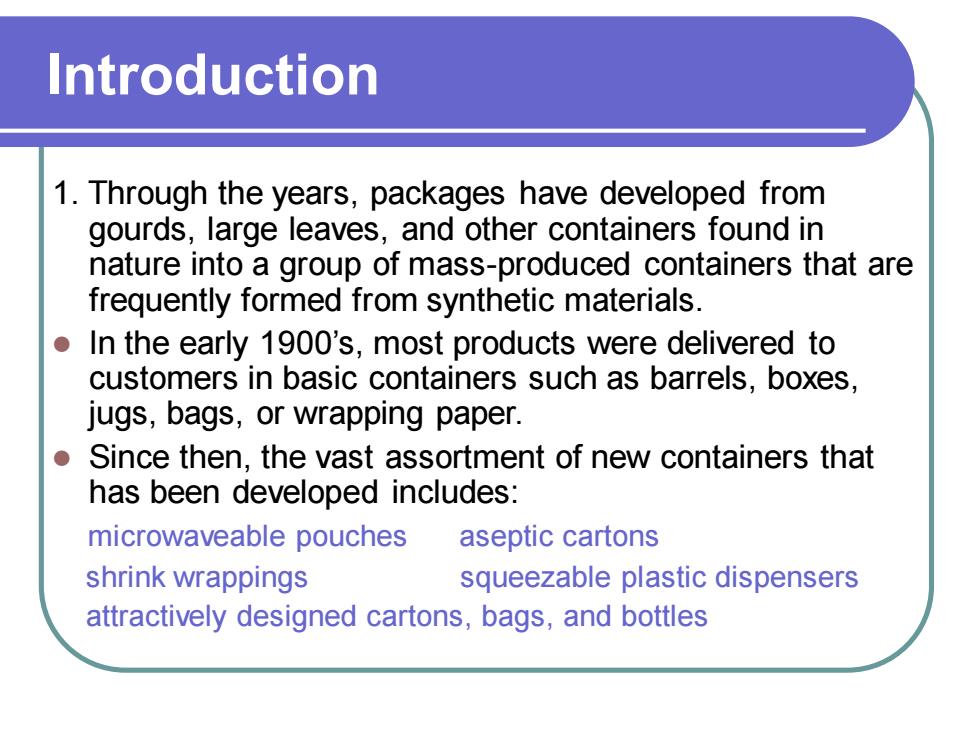
Introduction 1. Through the years, packages have developed from gourds, large leaves, and other containers found in nature into a group of mass-produced containers that are frequently formed from synthetic materials. ⚫ In the early 1900’s, most products were delivered to customers in basic containers such as barrels, boxes, jugs, bags, or wrapping paper. ⚫ Since then, the vast assortment of new containers that has been developed includes: microwaveable pouches aseptic cartons shrink wrappings squeezable plastic dispensers attractively designed cartons, bags, and bottles
Introduction 1. Through the years, packages have developed from gourds, large leaves, and other containers found in nature into a group of mass-produced containers that are frequently formed from synthetic materials. ⚫ In the early 1900’s, most products were delivered to customers in basic containers such as barrels, boxes, jugs, bags, or wrapping paper. ⚫ Since then, the vast assortment of new containers that has been developed includes: microwaveable pouches aseptic cartons shrink wrappings squeezable plastic dispensers attractively designed cartons, bags, and bottles
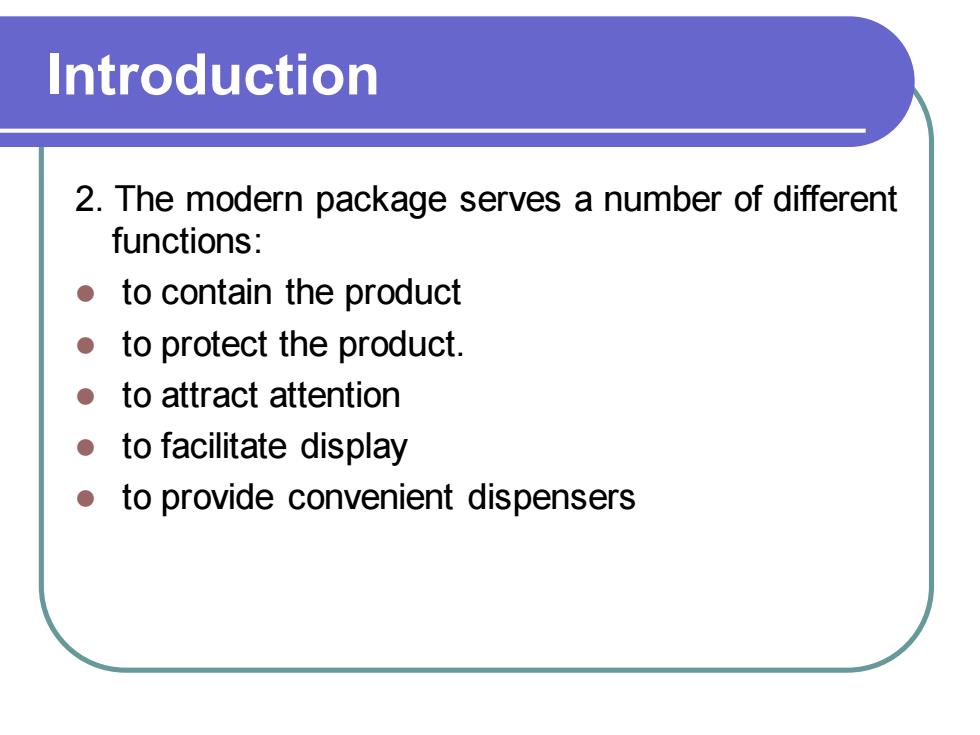
Introduction 2. The modern package serves a number of different functions: ⚫ to contain the product ⚫ to protect the product. ⚫ to attract attention ⚫ to facilitate display ⚫ to provide convenient dispensers
Introduction 2. The modern package serves a number of different functions: ⚫ to contain the product ⚫ to protect the product. ⚫ to attract attention ⚫ to facilitate display ⚫ to provide convenient dispensers
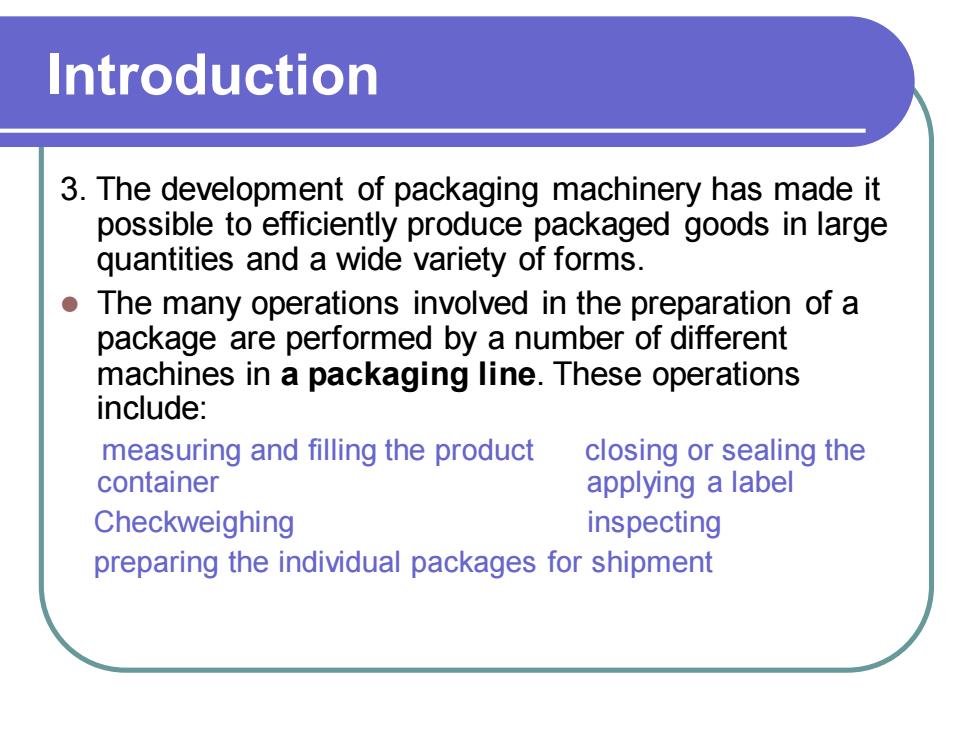
Introduction 3. The development of packaging machinery has made it possible to efficiently produce packaged goods in large quantities and a wide variety of forms. ⚫ The many operations involved in the preparation of a package are performed by a number of different machines in a packaging line. These operations include: measuring and filling the product closing or sealing the container applying a label Checkweighing inspecting preparing the individual packages for shipment
Introduction 3. The development of packaging machinery has made it possible to efficiently produce packaged goods in large quantities and a wide variety of forms. ⚫ The many operations involved in the preparation of a package are performed by a number of different machines in a packaging line. These operations include: measuring and filling the product closing or sealing the container applying a label Checkweighing inspecting preparing the individual packages for shipment
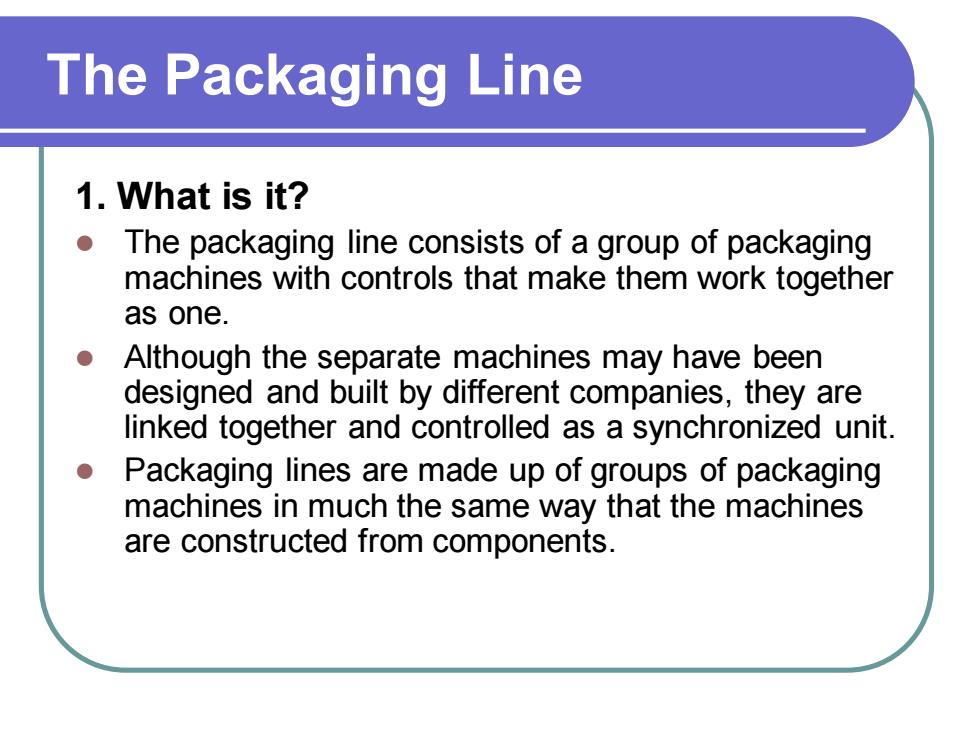
The Packaging Line 1. What is it? ⚫ The packaging line consists of a group of packaging machines with controls that make them work together as one. ⚫ Although the separate machines may have been designed and built by different companies, they are linked together and controlled as a synchronized unit. ⚫ Packaging lines are made up of groups of packaging machines in much the same way that the machines are constructed from components
The Packaging Line 1. What is it? ⚫ The packaging line consists of a group of packaging machines with controls that make them work together as one. ⚫ Although the separate machines may have been designed and built by different companies, they are linked together and controlled as a synchronized unit. ⚫ Packaging lines are made up of groups of packaging machines in much the same way that the machines are constructed from components
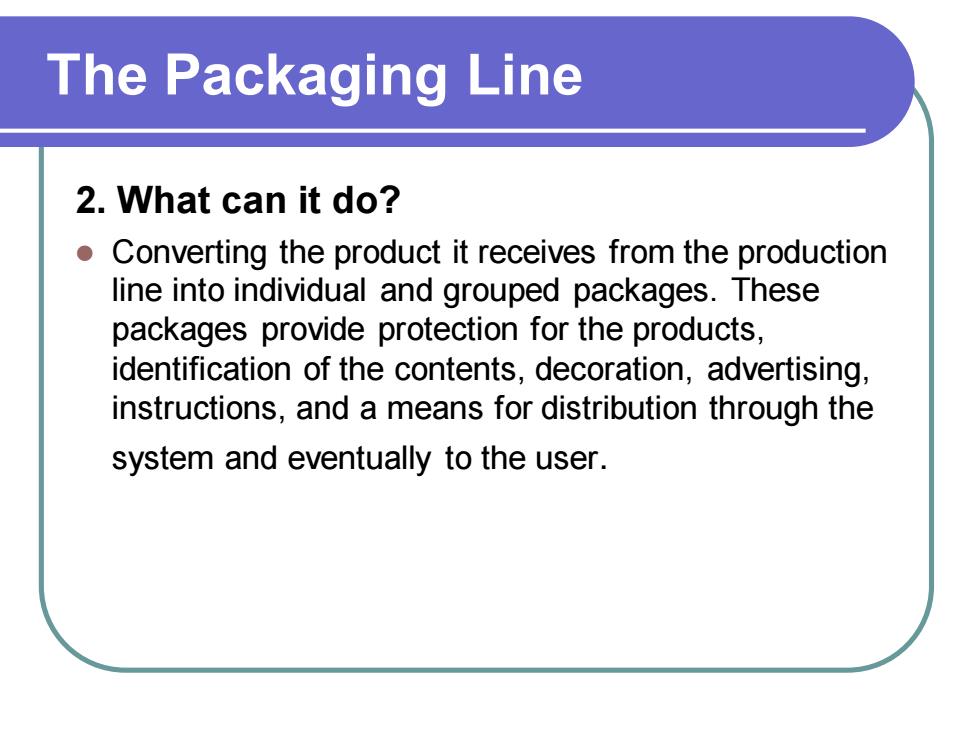
The Packaging Line 2. What can it do? ⚫ Converting the product it receives from the production line into individual and grouped packages. These packages provide protection for the products, identification of the contents, decoration, advertising, instructions, and a means for distribution through the system and eventually to the user
The Packaging Line 2. What can it do? ⚫ Converting the product it receives from the production line into individual and grouped packages. These packages provide protection for the products, identification of the contents, decoration, advertising, instructions, and a means for distribution through the system and eventually to the user
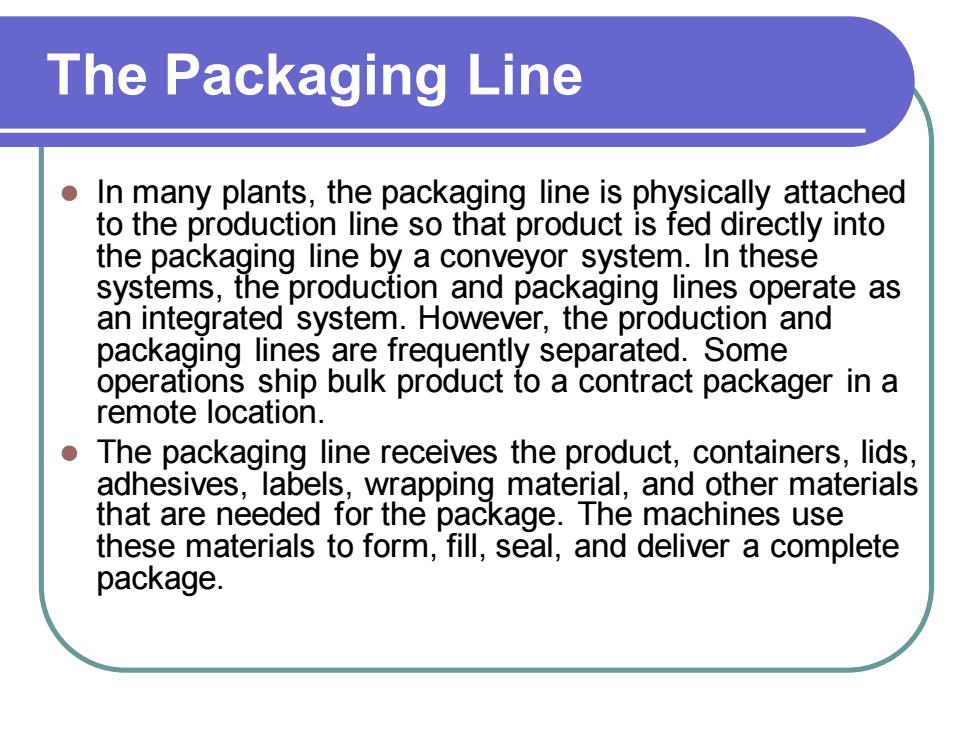
The Packaging Line ⚫ In many plants, the packaging line is physically attached to the production line so that product is fed directly into the packaging line by a conveyor system. In these systems, the production and packaging lines operate as an integrated system. However, the production and packaging lines are frequently separated. Some operations ship bulk product to a contract packager in a remote location. ⚫ The packaging line receives the product, containers, lids, adhesives, labels, wrapping material, and other materials that are needed for the package. The machines use these materials to form, fill, seal, and deliver a complete package
The Packaging Line ⚫ In many plants, the packaging line is physically attached to the production line so that product is fed directly into the packaging line by a conveyor system. In these systems, the production and packaging lines operate as an integrated system. However, the production and packaging lines are frequently separated. Some operations ship bulk product to a contract packager in a remote location. ⚫ The packaging line receives the product, containers, lids, adhesives, labels, wrapping material, and other materials that are needed for the package. The machines use these materials to form, fill, seal, and deliver a complete package
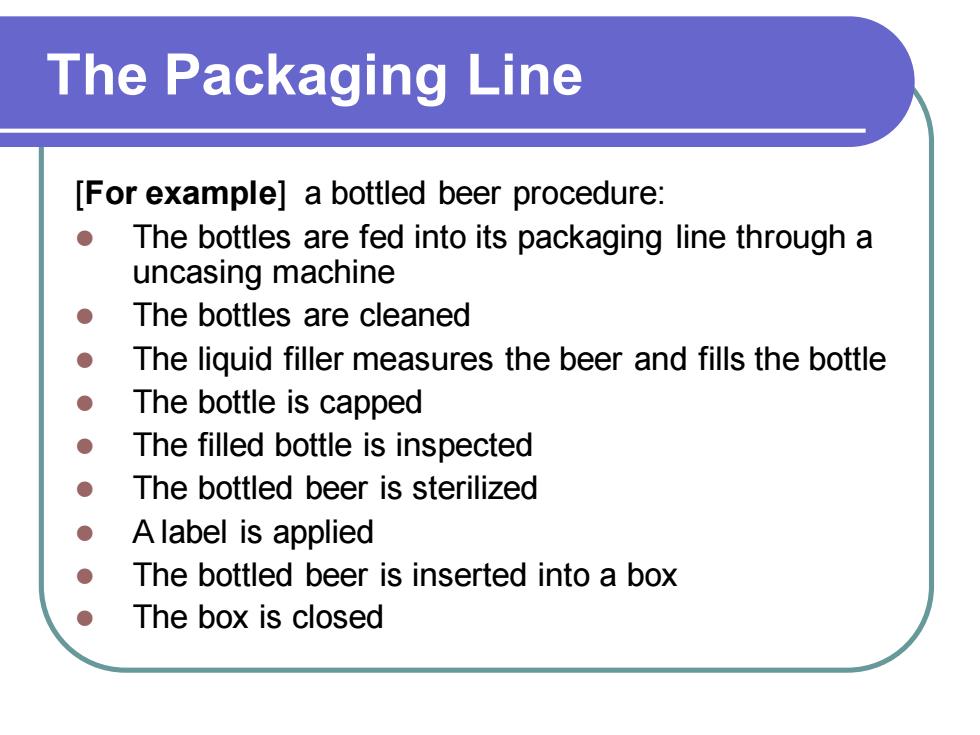
The Packaging Line [For example] a bottled beer procedure: ⚫ The bottles are fed into its packaging line through a uncasing machine ⚫ The bottles are cleaned ⚫ The liquid filler measures the beer and fills the bottle ⚫ The bottle is capped ⚫ The filled bottle is inspected ⚫ The bottled beer is sterilized ⚫ A label is applied ⚫ The bottled beer is inserted into a box ⚫ The box is closed
The Packaging Line [For example] a bottled beer procedure: ⚫ The bottles are fed into its packaging line through a uncasing machine ⚫ The bottles are cleaned ⚫ The liquid filler measures the beer and fills the bottle ⚫ The bottle is capped ⚫ The filled bottle is inspected ⚫ The bottled beer is sterilized ⚫ A label is applied ⚫ The bottled beer is inserted into a box ⚫ The box is closed